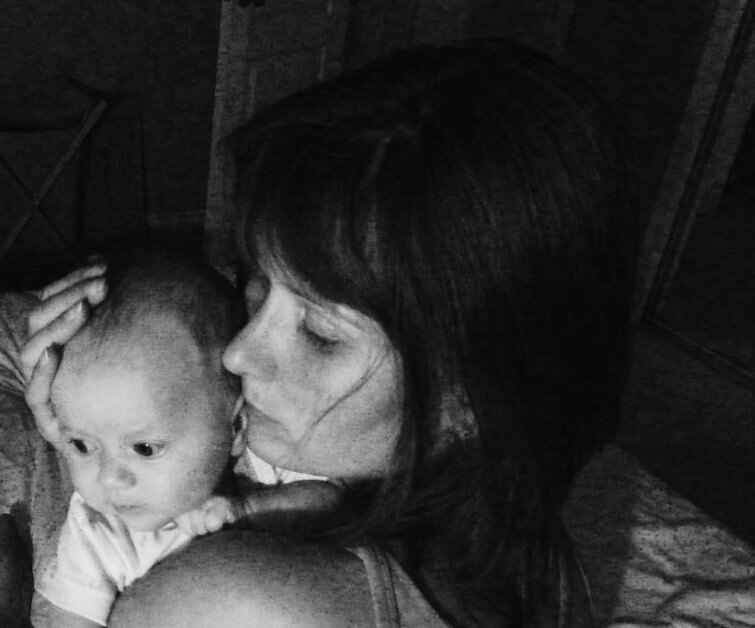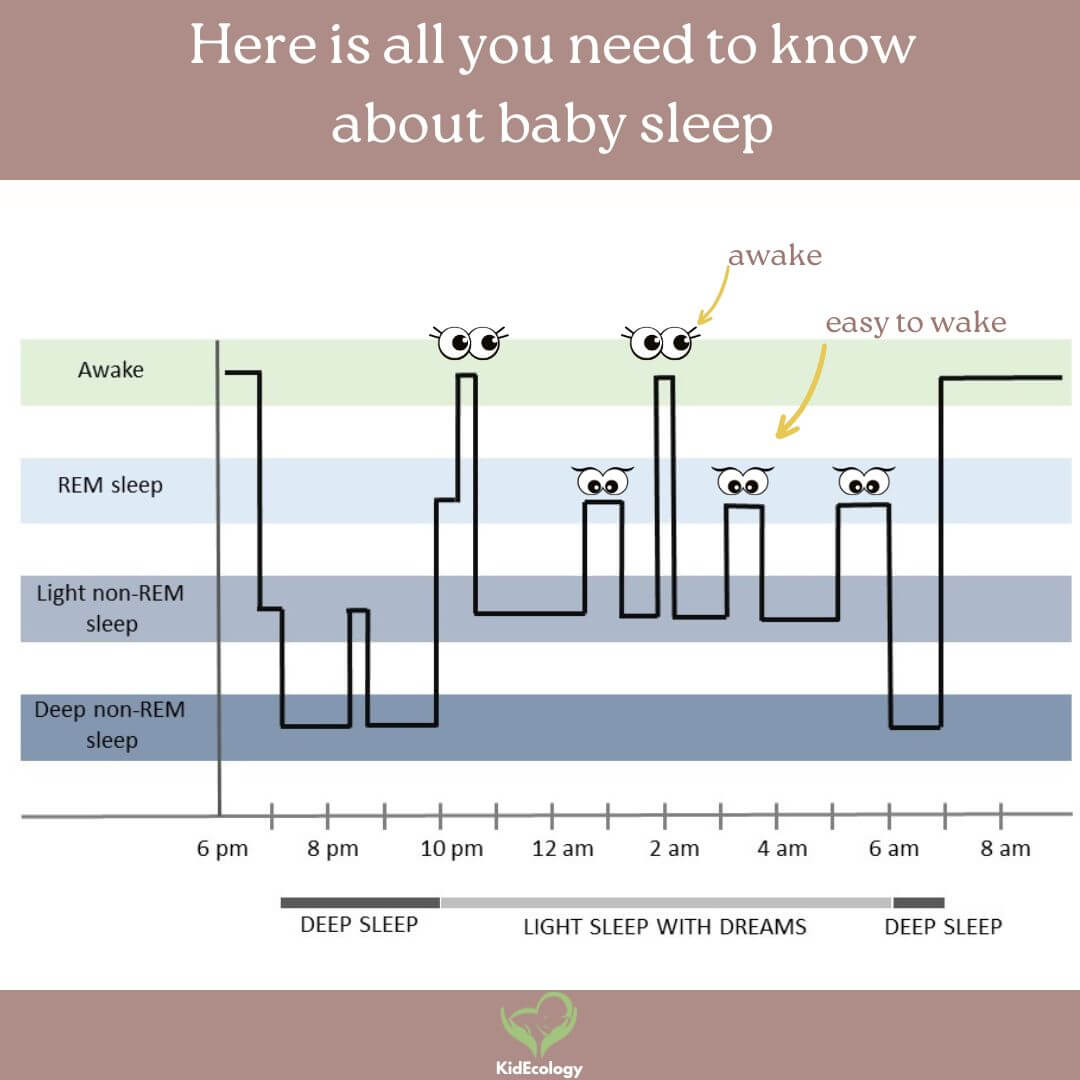Baby Ecology book is here! Learn more
Baby Ecology book is here!
- Home
- Help baby sleep
- Baby sleep cycles
- 4 Month Baby Sleep Regression
The 4 month baby sleep regression is a (tricky) step forward
by Anya Dunham, PhD
All about the 4 month baby sleep regression, from a research perspective: what is is, why it happens, two things to do, and two things to avoid.

You might have heard about – or, perhaps, are in the trenches of - the 4 month baby sleep regression.
Many families say that their previously good sleeper began waking a lot at night and struggling with naps around 4 months. Approximately 9% of babies have a very hard time sleeping at this age; some of these babies had colic and some did not.1 Many other babies still sleep fairly well, but wake up more than they did before. What is going on?
The 4 month baby sleep regression: three reasons why it happens
1. Your baby’s sleep is becoming more adult-like
Young babies often sleep quite a bit and go to sleep easily, because their homeostatic drive — also called sleep pressure2 — builds quickly, and they sleep for as long as they are tired. But now, at around 4 months old, your baby is developing distinct sleep cycles and tends to wake up briefly after each period of light REM sleep. (See those peaks into "awake" and "REM sleep" in the chart below? More details here.)

Once a baby develops distinct sleep cycles and consolidates most of her sleep into nighttime — usually by 4 months and almost always by 6 months — her sleep biology will remain fairly constant throughout her life.2,3 This really is a progression rather than a regression. (I think of it as a sleep shift.)
In other words, the main reason for the 4-month sleep regression is your baby’s new sleep structure.
2. Your baby is going through developmental leaps
There are many developmental leaps happening around this age: your baby is learning to roll, grasp, and use her voice in different ways; she’s figuring out patterns in the world around her and growing fast. She is working hard and may need extra time to wind down.
3. Your baby may be overtired
When a baby does not get the rest she needs in the early weeks, overtiredness may catch up to her around the 4-month mark. She may have been going to bed too late, napping during car rides, or staying awake too long between naps. As she moves to three naps a day, she may become overtired and her sleep may get disorganized.
Two things to do and two things to avoid
1. Create more opportunities for rest during the day
If you feel your baby is overtired, think about how you can offer her more sleep. Can you move her bedtime to an earlier hour or shorten her wake times? Might your baby be getting overstimulated when she’s awake and, because of that, having a harder time winding down? Can you make changes to her sleeping space to make it more conducive to sleep (for example, darker, quieter, or cooler)? Can you offer your baby the last nap of the day in a baby carrier if your baby sleeps well that way?
Even if your baby is well-rested, he’s still going through the sleep shift and developmental leaps. To help him navigate this phase, continue keeping him well-rested with the comfort of familiar routines. This might be the time to do fewer outings and baby activities – for a little while.
2. Guide your baby towards self-settling
The term “self-soothing” may sound negative, as it seems to imply that instead of actively comforting an upset baby, the parent leaves the baby to his own devices. I wholeheartedly agree that babies should not be left to “self-soothe” from a place of distress. However, a baby who woke between sleep cycles may be tired, but not necessarily in distress or even upset.
Many babies make at least brief attempts to calmly return to sleep on their own when they wake up when they are as young as 1 month old.4,5 (This is one reason why I prefer the term "self-settling".)
Do you want your baby to self-settle? I think most, if not all, parents do, regardless of their family's sleep arrangement. Whether your baby sleeps with you or on his own, his ability to self-settle during those wakings when he is comfortable but still tired and in need of more sleep, is what will bring more sound sleep to both of you. It will also bring you peace of mind. When you know your baby is capable of self-settling and you hear him calling out, you won’t have to lie in bed listening and guessing whether you should go to him. If he calls out, you know he likely has a need greater than his need for sleep. And if your baby knows how to self-settle, when he gets to the point where he is no longer hungry at night, he will “sleep through.”
Give your baby opportunities to experience what it feels like to go to sleep on her own when opportunities present themselves. (Here is how we did it.)
3. Don’t cut out night feeds or introduce solids if your baby isn't ready
Many sleep experts recommend starting some form of sleep training around this age, which usually involves cutting out at least some nighttime feeds. I don’t agree with this approach.
Continue feeding your baby when he’s hungry. Don’t introduce solid foods before 4 months in hopes of getting more sleep. Remember, your baby doesn’t wake up because he’s hungry; rather, he wakes up naturally between sleep cycles.
(Here are 4 signs your baby is ready for solids – none of them have to do with night wakings...)
4. Don’t go back to a late bedtime
Resist reverting to the late bedtime your baby had when she was younger. Sometimes parents go back to a late bedtime because their baby seemed to sleep better that way. The thing is, it’s the adults who were getting more sleep: the long stretch of baby’s sleep — the first one after baby goes to bed — used to overlap with theirs. But babies who go to bed late tend to get less sleep overall6,7 and can become overtired, which eventually leads to less sleep for the whole family.
Most importantly, take heart – lack of sleep during the 4 month baby sleep regression is not easy! Get as much rest as you can. Try not to focus on tiredness in a negative way or wish you could be more active or productive. As Karen Maezen Miller said in Momma Zen, “Don’t reject it… don’t inflate it with meaning or difficulty. Be what you are: be tired.”
I cover the 4 month baby sleep regression (and other sleep challenges) in more detail in my book, Baby Ecology.
References
References
1. Weissbluth M (2015) Healthy sleep habits, happy child: a step-by-step program for a good night's sleep (4th ed). Ballantine Books, USA
2. Jenni O, Carskadon M (2000) Normal human sleep at different ages: infants to adolescents. Pp 11-19 in: SRS Basics of Sleep Guide, Sleep Research Society, Westchester, IL, USA
3. Ferber R (2006) Solve your child's sleep problems: new, revised, and expanded edition. Touchstone, New York, NY, USA
4. Henderson JMT, France KG, Blampied NM (2011) The consolidation of infants' nocturnal sleep across the first year of life. Sleep Medicine Reviews 15(4): 211-220
5. Keener MA, Zeanah CH, Anders TF (1988) Infant temperament, sleep organization, and nighttime parental interventions. Pediatrics 81(6): 762-771
6. Mindell JA et al (2010) Cross-cultural differences in infant and toddler sleep. Sleep Medicine 11(3): 274-280
7. DeLeon CW, Karraker KH (2007) Intrinsic and extrinsic factors associated with night waking in 9-month-old infants. Infant behavior and Development 30(4): 596-605
Using hundreds of scientific studies, Baby Ecology connects the dots to help you create the best environment for sleep, feeding, care, and play for your baby.
Warmly,
Anya





